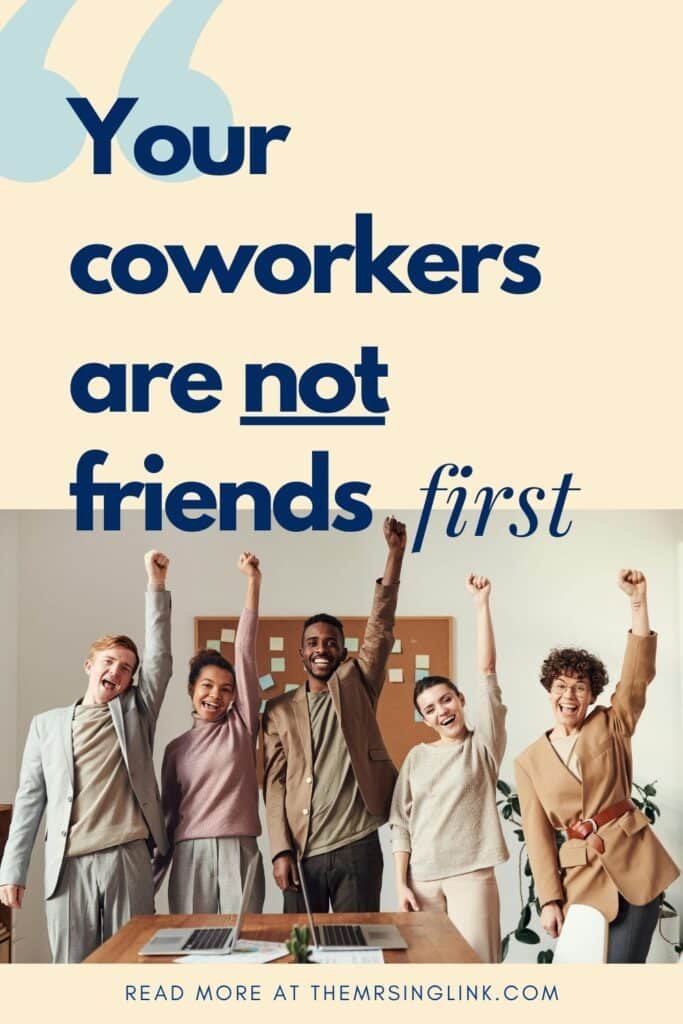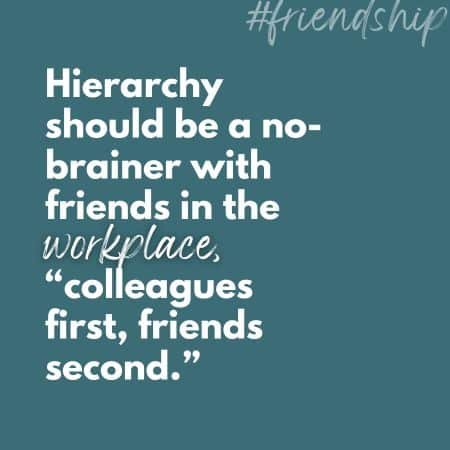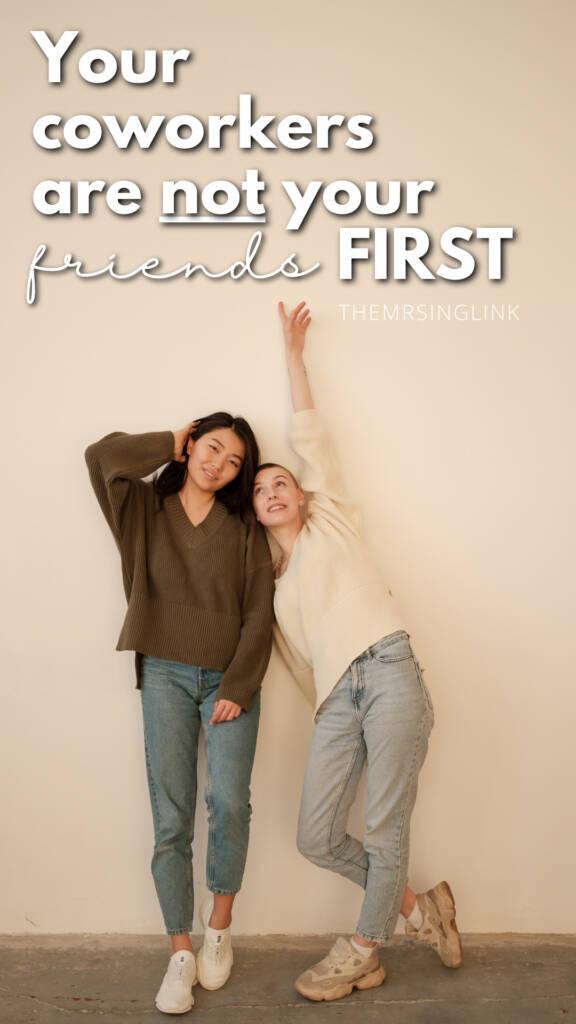Are we mistaking work colleagues, or work friendships as friends first?
I get it – making friends alongside those you work with isn’t so cut and dry. I also realize my take on this will probably make some people squirm. I learned this hard fact – that your coworkers are not your friends first – only after leaving the workplace and truly understanding friendship.
We often view and treat our job, and our way of making a living in this world, as something more. We argue that a greater portion of not only our day but our life is spent at work, so we ought to get more out of it than is necessarily intended. Personally, I don’t think that’s as healthy [of a concept] as we like to think. Killing two birds with one stone, so to speak; getting paid AND making friends doing it. I think this can often wind up being a double-edged sword.
Again, your colleagues or coworkers are not your friends first. We don’t like to acknowledge this but there are dangers to defaulting the people you work with as friendships. Yet I’ll bet if you asked many, including yourself and even I – our “friendship list” often consists of those from work.
There’s nothing wrong with making friends in the workplace, per say, but from personal experience I ran into a conundrum pertaining to work friends I never saw coming (when I only now realize this should have been obvious).
Before I quit my job to work from home, I was employed for 10-years in a heavily female-dominated industry. This was also an industry where newcomers came and went, often, and most were part of the “younger”, in-school crowd. Nonetheless, I made several friends over the course of that time from a considerably small practice (~less than 30 people). Some never made it past their expiration (when those people left the job, and I remained), and some did (even after I left).
Since then, years later, even those work friendships have fizzled on out. What I’ve learned over the years from working at home without the means of “making friends” through the workplace is that we often go into a job with the same “cut and dry” expectations. I anticipated making new friends on this new path, and it was exceedingly difficult as much as it was disappointing.
And that’s what I want to touch on in this post, primarily where we blur and often walk a thin line when it comes to friendship (it’s meaning, value and impact) in the workplace. We go into a job expecting to form friendships rather than with the focus of workplace relationships pertaining to work-related growth. There’s a clear-cut difference between the two.
How does this impact our work ethic and motivation as well as our perception of the work environment and those in it? Work friendships taught me an uncomfortable and valuable lesson the hard way I believe is often overlooked today. Your coworkers are not friends FIRST.
Unpopular opinion: the people you work with are not your friends first

If you’re not friends, then you’re an enemy
This sounds ways worse than it is, so let me explain better. There’s the misconception that if/when someone we work with doesn’t embody being a friend, or treat us as such, then it’s assumed that person doesn’t like us.
For instance, if someone doesn’t invite you to go out to happy hour or to hang out over the weekend, that [suddenly] means they don’t like you nor do they want to be your friend. And if those two things co-exist then that somehow makes that person an enemy. This happens more often and subtle than we think – we make it entirely personal. That if someone isn’t befriending you outside the workplace then they are also not a colleague.
This has certainly been other’s perception of me and mine of others in the workplace, and it often goes unnoticed, even if and when it begins to impact the work environment. We don’t tend to rationalize that, “Hey, just because we’re not friends in and outside of work doesn’t mean I can’t work with them, and that I shouldn’t be kind and respectful to them – that’s ridiculous.”
Oh, no, instead it’s more like, “Since Sally-sue and I are friends I’ll drop anything to help her – in fact, I’ll bend over backwards for her as long as she does for me. But if Susie-Cue asks me for help, no way, because we’re not friends – she can manage.” Old and young- I saw this act across the board.
Why. Do. We. Do. This? Part of me can only blame the fact we glorify and glamorize workplace friendships with bestie titles over relationships as professional colleagues. We’re not equally kind – we’re simply more willing to be kind (and sacrificial) to those we consider friends, while those who don’t fit that bill are somehow beneath us (our pay grade).
To put it frankly, its giving this level of energy: if they’re not your friend in and out of the workplace, *at best* they’re just an employee you tolerate working with.

Workplace hierarchy can feel low-key “oppressive”
People already have a very difficult time understanding the concept of respecting authority, especially of those who work “above you”. So imagine forming friends in the workplace with those who are competing for the same promotions as you.
Equality is the push today, but what happens when your work bestie gets a promotion that not only grants them a position above yours but more authority and responsibility over others, including you? A title where insubordination is not tolerated, let’s say.
Inherently, this means things change. If you are now your work friend’s boss, or they are yours, dynamic changes comes with the territory. This is the scenario I not only had to learn but also navigate with existing work friendships. My husband and his job included, now that he has worked his way up to sergeant and now lieutenant. A work friend of his in now Captain, which by rank is above him.
My husband once put it best, that, “He is Captain first, friend second.” The same hierarchy should be a no-brainer when applied to friends in the workplace, “Colleague first, friend second.”
For me and my previous job, when I was promoted to manager or overseer of an entire department, this meant I had to implement new/certain boundaries I could no longer cross with those workplace friends. This was incredibly difficult, because I would worry that being in charge would become a threat to those friendships I had made over the years.
How may hierarchy seem “oppressive” to some degree? Well, how are you going to feel if your friend from work gets a raise when you don’t, or is offered a position with more authority in telling you what to do and how to do it? How are you going to feel in times of carrying your own weight when it seems that friend carries less, handling critical feedback or when you are met with work-related reprimand by that friend who is also your supervisor? How do you think this will change your friendship outside of work, or do you think it will have any effect at all?
I promise you it does, because people struggle immensely separating the two.
There’s grave difficulty – more than those are willing to admit – in creating and maintaining separation between titles at work versus outside of work when none apply. AKA the separation of professional and personal life, and the separation between a professional colleague and that of a friend.
It can feel weird, confusing, constraining, restricting, burdensome [and the like] that you’re not allowed or are expected to treat your friend a certain way at work versus what is accepted and tolerated outside of work. Many are not here for it – that there should be zero difference and that the lines are to be blurred than distinct. We’re more likely to base that friend on who they are as a colleague, and that colleague on who they are as a friend.
For me, it definitely wasn’t always easy going from boss-mode to friend-mode. So for the average individual, it can seem oppressive (or not “fair”) having to clock out from “friendship”-mode and clock in to “co-worker”-mode on a regular basis.

The work-friends bounds are without limits
This was a problem I often encountered: I made several friends through work, whom I was often able to socialize with throughout the work day, for much of the work week when we worked together. Then came the weekend – whoo-hoo! Those same friends would then want to “hang out”.
Mind you, I enjoyed spending time with these people – there’s a reason I considered them friends. But I also had a life, with other things and people in it. I had a relationship – I, at one point, had other friends I didn’t work with. So there was this weird feeling about not wanting anything to do with the very people I spent the “most” time with (socially) during the work week. I often felt bound to these people in the name of being a “friend” outside of work (aside from colleague).
I would feel guilty turning down plans just to spend the weekend with my fiancé-at-the-time/husband, or simply other friends that weren’t them. There was this sense of, “I just saw you!” or “I need a break.” I was constantly bombarded with the intrusive thoughts that I should be prioritizing these friendships on a non-work-related level, especially since I was a supervisor.
I had built these friendships on the basis of work, because my job enabled me to do so. But when it came to my personal life, I wanted to prioritize other things when I felt I couldn’t without running the risk of sabotaging those work friendships.

When separation is lost, where does your loyalty lie?
What I mean is there’s no longer a distinct separation between work life and personal life because you share/overlap both. So when you get together with these work friends, what commonality do you have? Work. What are you usually driven to talk about? Work. Maybe you do have similar shared interests beyond mutual labor, but when it’s time to clock back in are you able to differentiate your friendship from that of inside and outside the workplace?
Meaning, are you able to maintain healthy, mutual workplace-related respect of each other’s time, duties, responsibilities, priorities, etc.?
If you end up making work your identity, where is the boundary that says “I will not bring work home with me,” or one we also fail at, “I will not bring home with me to work“? Granted, some will say they have no choice, but I find that aside from logistical tasks many often end up blurring the lines themselves and do away with work and personal life separation. Not only does career become sole purpose but our esteem is driven by constant ambition – doing better and better, getting better and better, receiving better and better.
So we frown upon people who don’t pick up their phone all weekend or on their days off – why does our job demand this level of loyalty and access to us?! Not so fast because friends demand this, too.
Then there are those who bring home to work – personal matters, attitude, inefficiency/unproductivity, inappropriate conversations, and sense of authenticity that goes beyond a “professional” standard. And, ladies, I’m not talking about things we can’t necessarily control, like our vicious time of the month.
Therefore – back to workplace friendships – I ran into instances where these friends found no issue violating or minimizing my work life and personal life boundaries. It really got to a point sometimes where it genuinely felt they were testing my loyalty. Friendship loyalty is already a thing, now add in the workplace dynamic.
[Workplace cliques have now entered the chat].
This can be absolutely lethal. A prime example of this loyalty is a friend expecting (or anticipating) that I would [always] cover for them whenever they needed or asked. This friend would ultimately treat me different if/when I didn’t. Another example would be encountering an issue that results in having to either back that friend or confront my superior with the truth.
The essence of career has come to a fork in terms of which, or who will get the very best of you and is deserving of your loyalty. And I just don’t think it’s always possible to serve both.
*Sigh*, I hate that I’ve made this post seem so unappealing. Of course there’s nothing wrong with practicing the qualities of friendship in and out of work and benefitting from them, until work inevitably ushers its way in the middle of having to choose between honoring that “friend”…or your “job”.
The fact is, you aren’t hired to make friends (which is not the same as creating and maintaining professional workplace relationships), so it’s about choosing your loyalty when serving both is not promised (doing your job and making friends).
In the end, when you apply for a job, is the main purpose for *doing* a job? Work friends, as a result, ought to be considered a privilege rather than a promise. And I think that’s what needs more thoughtful and careful consideration in terms of anticipating or making friends in the workplace: that coworkers are not friends first.
